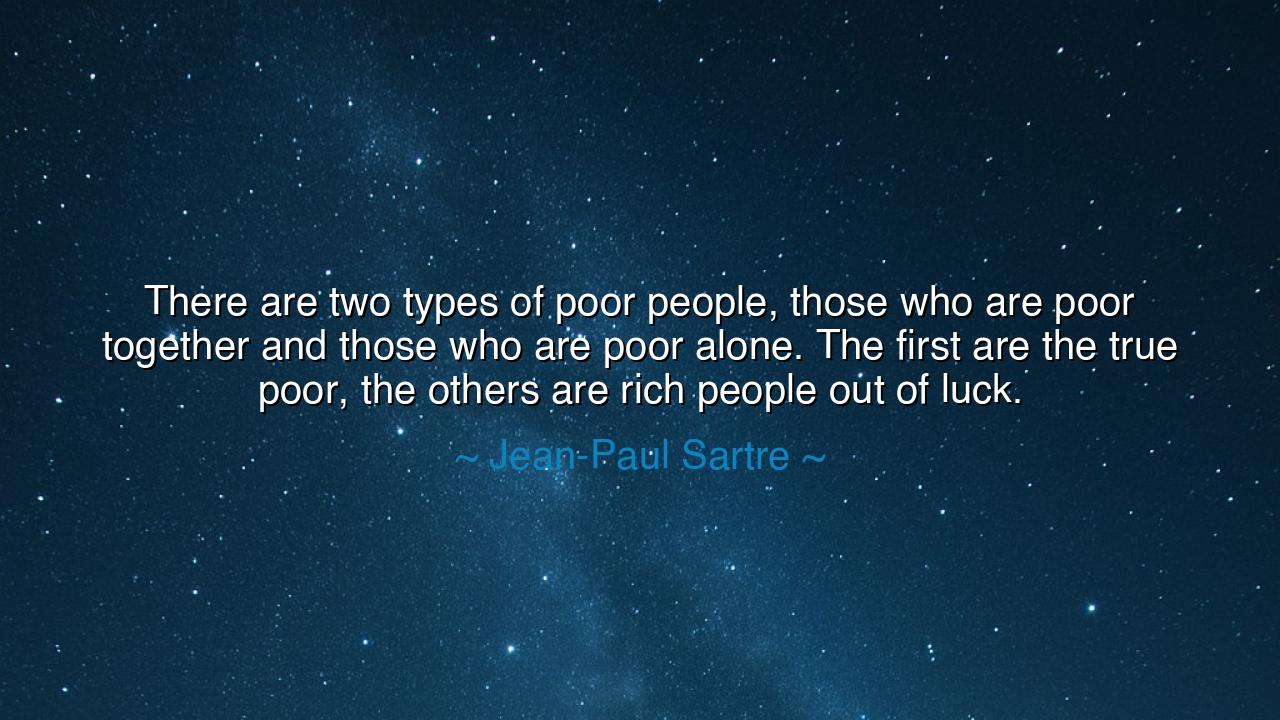
There are two types of poor people, those who are poor together
There are two types of poor people, those who are poor together and those who are poor alone. The first are the true poor, the others are rich people out of luck.






In the penetrating words of Jean-Paul Sartre, he declared: “There are two types of poor people, those who are poor together and those who are poor alone. The first are the true poor, the others are rich people out of luck.” In this seemingly simple statement, the philosopher of existence reveals a profound truth about community, dignity, and the nature of poverty itself. Sartre, who lived through war, revolution, and the moral desolation of the twentieth century, saw beyond the material measure of wealth. To him, true poverty was not defined by the absence of money, but by the presence or absence of solidarity. Poverty shared in fellowship becomes a condition of humanity; poverty borne in isolation becomes a wound of pride.
When Sartre speaks of those who are poor together, he speaks of people who, though stripped of luxury, remain rich in compassion. Their suffering is not a solitary prison, but a shared endurance. These are the “true poor,” for they live close to the essence of being — stripped of illusion, yet bound by the warmth of human bond. In the humble quarters of the poor together, there is laughter, generosity, and the quiet strength of survival. They are not defined by what they lack, but by what they share. To be poor together is to be human in the most honest way — dependent, vulnerable, and yet capable of love.
But those who are poor alone, Sartre calls “rich people out of luck.” These are the ones who once lived in the world of possessions and independence, who measured themselves by wealth, status, and comfort. When fortune leaves them, they find themselves impoverished not merely in coin, but in spirit. They are poor not because they lack, but because they cannot bear to need. Isolation becomes their prison; pride their torment. The community of the humble, which could sustain them, feels foreign — for they never learned the sacred art of togetherness. Thus, they are not truly poor, for they have not yet surrendered their old illusions; they are only exiles from wealth, lost between worlds.
This truth has echoed through history. Consider the story of Victor Hugo’s Jean Valjean, a man who knew both destitution and grace. At first, cast out by society, he was a poor man alone — hungry, despised, and hardened by the cruelty of the world. But when he met the humble bishop who gave him bread and forgiveness, he was reborn. He learned the dignity of shared humanity — that compassion is the one treasure that enriches even the poorest heart. In helping others, he became not just redeemed, but truly human. Thus, Sartre’s words find life in this tale: the poor man who shares his loaf is richer than the rich man who eats in solitude.
To be poor together is to live in the fellowship of endurance, to know that one’s suffering is seen, one’s struggle understood. It is a state of poverty that humbles but does not dehumanize, for it opens the door to empathy and love. To be poor alone, however, is to dwell in the cold shadow of alienation, where no one’s eyes meet yours and every burden feels eternal. Sartre, the philosopher of freedom, reminds us that human worth is not in possessions, but in connection — that wealth of the soul which no coin can buy and no misfortune can steal.
The lesson, then, is clear: seek togetherness in all seasons of life, whether in poverty or in plenty. Do not measure worth by ownership, but by openness. When hardship comes — and it always does — resist the temptation to withdraw in shame or pride. Instead, reach out. Share your bread, your time, your words, your presence. The act of sharing transforms want into wealth, loneliness into communion. As the ancients taught, “A burden shared is halved, but a joy shared is doubled.”
So, dear listener, remember the wisdom of Jean-Paul Sartre: wealth and poverty are not merely conditions of the body, but of the soul. The poor man who walks hand in hand with others walks in light, while the rich man who stands alone walks in shadow. If you find yourself in hardship, seek not pity but kinship; if you find yourself in abundance, build not walls but tables. For when we learn to be poor together, we discover the one treasure that endures beyond fortune — the sacred bond of our shared humanity.
Thus, Sartre’s words echo across time as both warning and hope: poverty without love is despair, but poverty with love is strength. The true wealth of man lies not in what he owns, but in how deeply he belongs.






AAdministratorAdministrator
Welcome, honored guests. Please leave a comment, we will respond soon